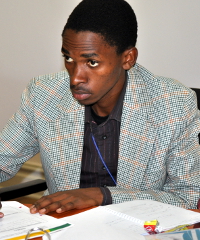Starting a company at age 14? No sweat!
Brought to you by: The Anzisha Prize
“I’ve learnt to listen to my intuition. And it has helped me make better decisions around managing people and my business.”

“Follow that small voice that is talking to you inside of your heart, and listen to it with your mind, but critically. It will help you make the right decisions,” says Noah Walakira.
Ugandan Noah Walakira was just 14 when he started Namirembe Sweater Makers, a community-based organisation that started off by manufacturing knitted jerseys for schools in Kampala. It was a skill his grandmother taught him during school holidays, and while no longer around today, Walakira knows she’d be proud to see what he’s done with the skill.
Today Namirembe Sweater Makers employs around 20 people in his community and has diversified its offering to manufacturing various uniforms – from sportswear to ties – for over 45 schools in Uganda, as well as for other organisations such as security companies. On an average month, the company can produce around 500 sweaters, with each costing a school about US$7. And Walakira, now 23, has managed to put himself and other young employees through school with the earnings.
His success had not gone unnoticed, with the Anzisha Prize – a pan-African organisation which celebrates young entrepreneurs between 15 and 22 – naming Walakira a finalist for its annual award last year.
Furthermore, his company has provided many youths in his community with vocational skills and employment. Uganda has the largest percentage of people under the age of 30 in the world, which has translated into high numbers of youth unemployment. This is something he hopes to continue tackling.
Being a young employer
Having run a small factory from the age of 14, Walakira has learnt a number of business lessons, including how to manage employees double his age.
“I try to make sure that they have it in their minds that they are not just being employed by a 14 or 23 year old, but rather the company,” he says, adding he never wants his age to affect an older employee’s ambition within the organisation.
He has also learnt how to better communicate with authorities and comply with business regulations after his factory was shut down once due to a misunderstanding around operating licences. But most importantly, he says he has also grown to realise he has the potential to make a difference in his community as well as grow a national – even pan-African – company.
“In five years I see more branches opening and helping out jobless people in different areas. There are so many who are suffering [from unemployment], especially in the North-West,” he continues.
“I am already thinking of how to expand this initiative and work with these communities to solve some of the problems around poverty.”
Guided by intuition
“Let your vision and passion drive you,” advises Walakira, adding that without these two elements, young entrepreneurs will not be able to persist when facing the overwhelming number of challenges.
“If you do not love what you are doing, then go back to the drawing board and find something you do love,” he adds.
“Follow that small voice that is talking to you inside of your heart, and listen to it with your mind, but critically. It will help you make the right decisions.”
The Anzisha Prize is the premier award for African entrepreneurs aged 15-22 who have developed and implemented innovative businesses or solutions that have a positive impact on their communities. Follow The Anzisha Prize on Twitter, Facebook and YouTube.

